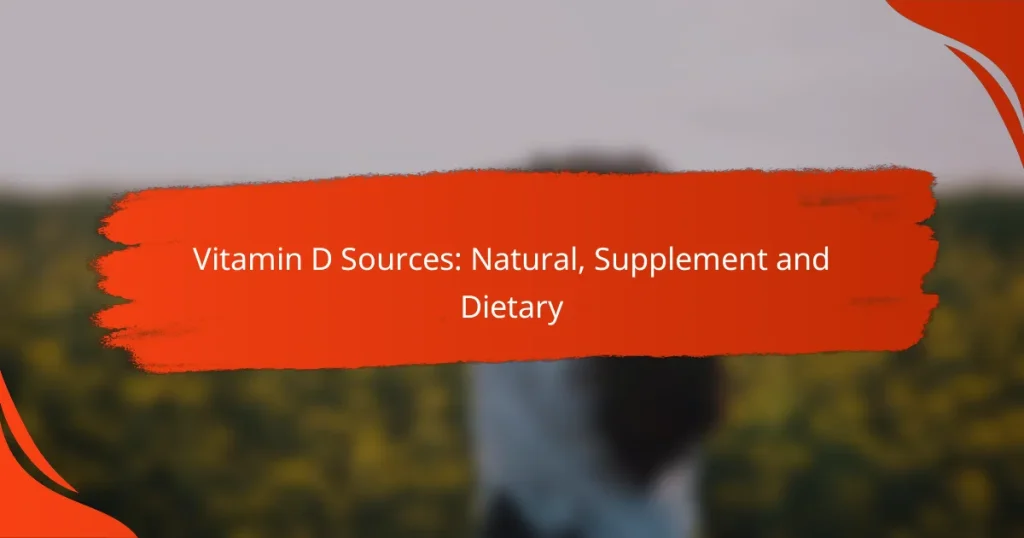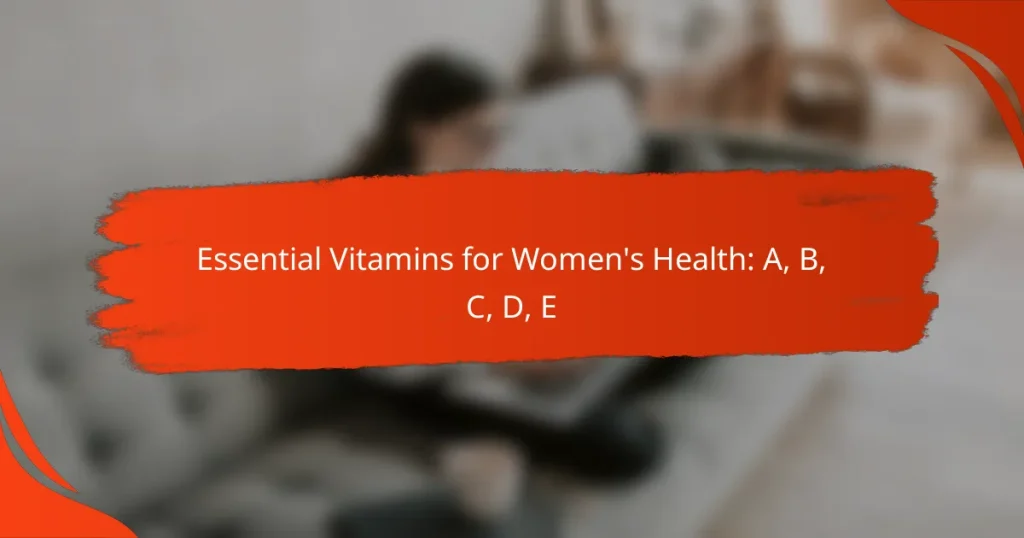Vitamins and minerals are vital for women’s health, influencing everything from energy levels to reproductive wellness. Key nutrients such as Vitamin D, B12, and folic acid, along with essential minerals, support bone strength and overall well-being. A balanced diet rich in whole foods is essential to meet these nutritional needs and promote optimal health.
Iron Supplements: Role, Benefits and Timing
Folate for Pregnant Women: Benefits, Sources and Dosage
Calcium Supplements: Types, Dosage, and Benefits
Essential Vitamins for Women’s Health: A, B, C, D, E
Multivitamins for Women: Budget Options and Premium Choices
Omega-3 Fatty Acids: Benefits, Sources and Dosage
What vitamins are essential for women’s health?
Essential vitamins for women’s health include Vitamin D, B12, folic acid, Vitamin C, and Vitamin E. These nutrients play crucial roles in maintaining overall well-being, supporting energy levels, and promoting specific health outcomes such as bone strength and skin health.
Vitamin D for bone health
Vitamin D is vital for bone health as it aids in calcium absorption, helping to maintain strong bones. Women, especially those over 50, are at higher risk for osteoporosis, making adequate Vitamin D intake essential.
Sources of Vitamin D include sunlight exposure, fatty fish, fortified dairy products, and supplements. Aim for a daily intake of around 600 to 800 IU, especially during winter months when sunlight is limited.
Vitamin B12 for energy
Vitamin B12 is crucial for energy production and the formation of red blood cells. A deficiency can lead to fatigue, weakness, and neurological issues, particularly in women who follow a vegetarian or vegan diet.
Good sources of B12 include meat, fish, eggs, and dairy products. Women should consider a daily intake of about 2.4 micrograms, and those on plant-based diets may need to take supplements to meet their needs.
Folic acid for pregnancy
Folic acid is essential for women who are pregnant or planning to conceive, as it helps prevent neural tube defects in the developing fetus. It is recommended to start supplementation before conception and continue through the first trimester.
The recommended daily intake for folic acid is 400 to 800 micrograms. Foods rich in folate include leafy greens, legumes, and fortified cereals, making it easier to meet this requirement through diet and supplements.
Vitamin C for immune support
Vitamin C is known for its role in supporting the immune system and protecting against oxidative stress. It helps in the production of collagen, which is important for skin health and wound healing.
Women should aim for a daily intake of about 75 to 90 milligrams of Vitamin C. Citrus fruits, strawberries, bell peppers, and broccoli are excellent sources, making it easy to incorporate into daily meals.
Vitamin E for skin health
Vitamin E is an antioxidant that helps protect skin cells from damage caused by free radicals. It also plays a role in skin repair and hydration, making it important for maintaining a youthful appearance.
The recommended daily intake for Vitamin E is about 15 milligrams. Sources include nuts, seeds, and vegetable oils. Consider using skincare products that contain Vitamin E for added benefits to skin health.
How do minerals support women’s health?
Minerals play a crucial role in supporting women’s health by contributing to various bodily functions and preventing specific health issues. Adequate intake of essential minerals can enhance bone density, regulate menstrual cycles, alleviate stress, and support reproductive health.
Calcium for osteoporosis prevention
Calcium is vital for maintaining strong bones and preventing osteoporosis, a condition that affects many women, especially post-menopause. Women should aim for about 1,000 to 1,200 mg of calcium daily, depending on age and life stage.
Good dietary sources include dairy products, leafy greens, and fortified foods. Consider supplements if dietary intake is insufficient, but consult a healthcare provider to avoid excessive intake, which can lead to kidney stones.
Iron for menstrual health
Iron is essential for women, particularly during menstruation, as blood loss can lead to lower iron levels and potential anemia. Women aged 19-50 typically need about 18 mg of iron per day to maintain healthy levels.
Foods rich in iron include red meat, poultry, fish, lentils, and spinach. Pairing iron-rich foods with vitamin C sources, like citrus fruits, can enhance absorption. Be cautious with iron supplements, as excessive iron can be harmful.
Magnesium for stress relief
Magnesium plays a significant role in managing stress and supporting mental health. It helps regulate neurotransmitters that send signals throughout the nervous system, promoting relaxation and reducing anxiety.
Women should aim for around 310 to 320 mg of magnesium daily, found in nuts, seeds, whole grains, and leafy greens. Consider magnesium supplements if stress levels are high, but consult a healthcare professional for appropriate dosages.
Zinc for reproductive health
Zinc is crucial for reproductive health, supporting hormone production and immune function. Women require about 8 mg of zinc daily, with higher needs during pregnancy and lactation.
Sources of zinc include meat, shellfish, legumes, seeds, and nuts. A balanced diet usually provides sufficient zinc, but supplementation may be necessary for those with dietary restrictions or absorption issues. Always consult a healthcare provider before starting supplements.
What are the best sources of vitamins and minerals?
The best sources of vitamins and minerals include a variety of whole foods that are rich in essential nutrients. Incorporating a diverse range of fruits, vegetables, nuts, seeds, and lean meats into your diet can help ensure you meet your nutritional needs.
Leafy greens for vitamin K
Leafy greens are excellent sources of vitamin K, which is crucial for blood clotting and bone health. Foods like kale, spinach, and Swiss chard provide significant amounts of this vitamin, often exceeding the daily recommended intake in just one serving.
To maximize your vitamin K intake, aim to include a variety of these greens in your meals. A simple salad with mixed greens can be a great way to boost your vitamin K levels while enjoying a nutritious dish.
Citrus fruits for vitamin C
Citrus fruits, such as oranges, grapefruits, and lemons, are well-known for their high vitamin C content. This vitamin is vital for immune function, skin health, and antioxidant protection.
Consuming one medium orange or half a grapefruit can provide nearly all of your daily vitamin C needs. Incorporating these fruits into your breakfast or snacks can help you easily meet your requirements.
Nuts and seeds for magnesium
Nuts and seeds are rich in magnesium, an essential mineral that supports muscle function, nerve transmission, and energy production. Almonds, cashews, and pumpkin seeds are particularly high in magnesium.
A handful of nuts or a sprinkle of seeds on your salad or yogurt can significantly enhance your magnesium intake. Aim for about 30-40 grams of nuts or seeds daily to support your health.
Red meat for iron
Red meat is a primary source of heme iron, which is more easily absorbed by the body compared to non-heme iron found in plant foods. Iron is essential for the production of hemoglobin, which carries oxygen in the blood.
Including lean cuts of beef or lamb in your diet a few times a week can help maintain healthy iron levels. Pairing red meat with vitamin C-rich foods can further enhance iron absorption.
How to choose vitamin and mineral supplements?
Selecting vitamin and mineral supplements requires careful consideration of your individual health needs and dietary habits. Focus on supplements that align with your nutritional requirements and are backed by quality testing.
Consider dietary needs
Your dietary needs are unique and depend on factors such as age, lifestyle, and health conditions. Assess your current diet to identify any gaps in essential nutrients. For instance, women of childbearing age may need higher levels of folic acid, while postmenopausal women might benefit from increased calcium and vitamin D.
Keep in mind that whole foods are the best source of vitamins and minerals. Supplements should complement your diet, not replace it. If you have specific health concerns, consult a healthcare professional to tailor your supplement choices accordingly.
Check for third-party testing
Third-party testing ensures that the supplements you choose meet quality and safety standards. Look for certifications from reputable organizations like the NSF International or US Pharmacopeia (USP), which verify that products contain the ingredients listed on the label without harmful contaminants.
Choosing products with third-party testing can provide peace of mind regarding potency and purity. Always check the label for these certifications before making a purchase.
Look for bioavailability
Bioavailability refers to how well your body can absorb and utilize the nutrients in a supplement. Some forms of vitamins and minerals are more easily absorbed than others. For example, magnesium citrate is generally better absorbed than magnesium oxide.
When selecting supplements, opt for those that use highly bioavailable forms of nutrients. Research product labels for specific ingredient forms and consult with a healthcare provider if you’re unsure which options are best for your needs.






